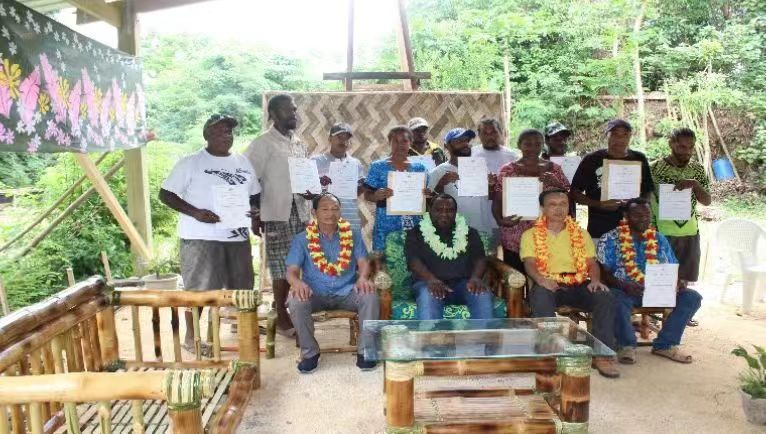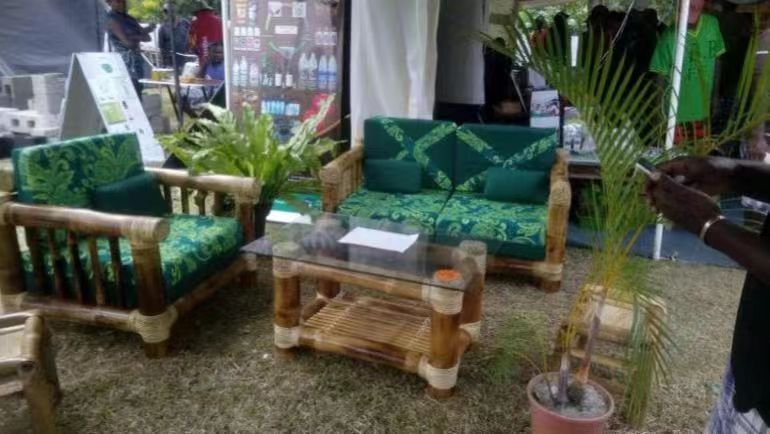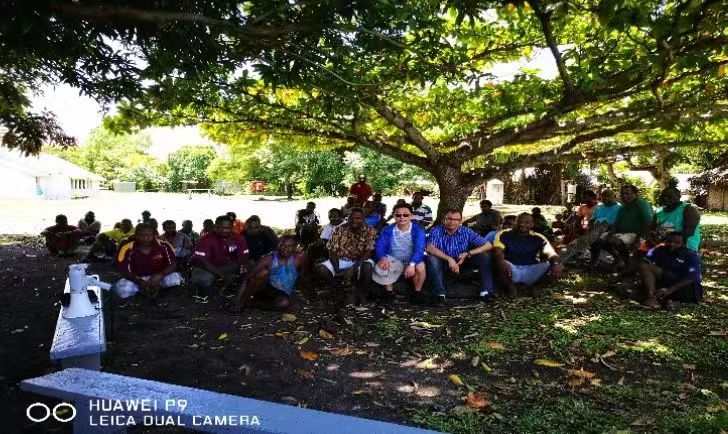 Value-Added Bamboo Processing Development in Vanuatu
Creating a value-added bamboo agro-industry for improving rural livelihoods
Value-Added Bamboo Processing Development in Vanuatu
Creating a value-added bamboo agro-industry for improving rural livelihoods

Challenges
Towards a Solution
The Value-Added Bamboo Processing Development in Vanuatu project aims to develop a value-added bamboo sector as a new green alternative for the agro-industry to address the aforementioned social, economic, and ecological challenges, considering the unique advantages of bamboo, such as fast growth, strong-renewing, short-cycle and big-biomass.
Three Chinese experts from the China National Bamboo Research Center (CBRC) were deployed in Vanuatu to assess the bamboo sector situation, and to organize a bamboo furniture workshop to build the capacities of bamboo producers. A three-week-long hands-on training was conducted on how to make bamboo furniture by using China-made hand tools and Chinese bamboo technology /expertise. Twenty local artisans and small business owners were trained to make bamboo furniture streamlined from the selection of bamboo, to apply eco-friendly treatment of the material, to design products, to bend furniture by fire and to assemble it.
Training workshops on bamboo furniture and curtain production were also organized locally. Samples of bamboo products were shipped to raise public awareness of the bamboo industry. To ensure the sustainability of the initiative, four training manuals were compiled on bamboo furniture, propagation skills and cultivation knowledge to ensure technical expertise transfer.
Furthermore, two on-site field missions were conducted by CBRC experts to support the government of Vanuatu in formulating the strategic plan of Bamboo Sector Development in Vanuatu (2018-2028). The Strategic Plan mapped out an area of 56,9862 ha bamboo plantation to be developed and improved, of which 55,677 ha was for bamboo charcoal production, 903 ha for housing, 180.7 ha for bamboo furniture and 225.5 ha for bamboo curtain and handicrafts. Six bamboo species were identified for introduction from China to Vanuatu to upgrade its quality of bamboo plantation to meet the demands of production of high-value bamboo products.
The project implementation involved the participation of multiple international partners, including the CBRC, the Department of Industry at the Ministry of Trade, Tourism, Commerce and Industry of Vanuatu, the Department of Forest of the Ministry of Agriculture, Livestock, Forestry, Fisheries and Biosecurity of Vanuatu, under the sponsorship of both the Governments of China and Vanuatu, the China South-South Development Center Project and UNIDO.
Through these partnerships, the project fostered innovative solutions by creating an alternative bamboo agro-industry to solve ecological challenges imposed by over logging to meet high and rigid demands of fuel charcoal, furniture and other necessary daily products and to maximize limited land resources.
The project is sustainable for such island countries as Vanuatu since bamboo production is characterized by much lower costs when compared to other products which depend mainly on imports. Bamboo is also a versatile material, which can be used by people in both rural and urban areas. It also substitutes other materials, such as plastic which damages and pollutes the environment, and wood which leads to deforestation. Additionally, the increase in the supply of bamboo can contribute to larger availability of sustainable and affordable housing, and bamboo charcoal can replace woodburning and charcoal.
The project has been successfully replicated in other Pacific Island countries with rich and untapped bamboo resources and facing similar challenges, including Fiji and Timor Leste. The bamboo sector should make a significant contribution to rural development through exploring their rich bamboo resources since those technologies are easy to learn, simple to operate, small to input and fast to return.
Contact Information
Countries involved
Supported by
Implementing Entities
Project Status
Project Period
URL of the practice
Primary SDG
Primary SDG Targets
Secondary SDGs
Secondary SDG Targets
Similar Solutions
| NAME OF SOLUTION | Countries | SDG | Project Status | |
|---|---|---|---|---|
A Billion Brains: Smarter Children, Healthier Economies High Level Meeting on South-South Cooperation for Child Rights |
China, Vanuatu | 17 - Partnerships for the Goals | Completed | View Details |
Accelerating the Implementation of African Union Treaties in São Tomé and Príncipe South-South learning from the Beninese judicial system’s experience in the application of human rights treaties to its national law |
China, Vanuatu | 05 - Gender Equality | Completed | View Details |
Accelerating the Transformational Shift to a Low-Carbon Economy in Mauritius Towards supplying 35 percent of the country’s energy needs with renewables by 2025 |
China, Vanuatu | 05 - Gender Equality 09 - Industry, Innovation and Infrastructure 13 - Climate Action | Ongoing | View Details |
Accelerator Labs Network Following collective intelligence methods to address emerging sustainability challenges and the growing demand for local solutions |
China, Vanuatu | 08 - Decent Work and Economic Growth 13 - Climate Action | Ongoing | View Details |
Accessibility of Financial Services and the Private Sector in Africa Maximizing the impact of financial cooperation on economic development and industrialization in Africa |
China, Vanuatu | 08 - Decent Work and Economic Growth | Completed | View Details |



